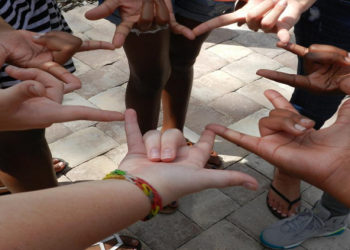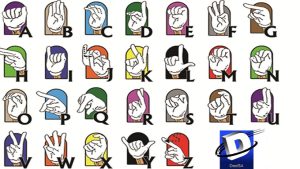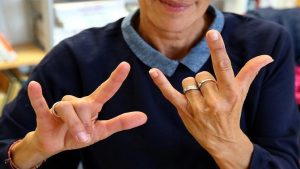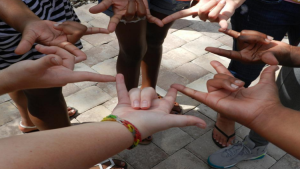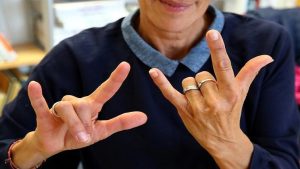The Free State provincial government should start appointing more deaf people to its departments. These are the sentiments of Alcina Mofokeng, a partially deaf social auxiliary worker for Deaf SA.
She says that as members of the deaf community, they feel snubbed by the government as they’re often sidelined from various opportunities, including service delivery matters.
This comes as President Cyril Ramaphosa signed the country’s Sign Language Bill into law yesterday, making it the 12th official language.
Importance of Sign language becoming official: Jabulani Blose
Alcina Mofokeng is hard of hearing. She’s partially deaf and can also lip-read.
Growing up wasn’t easy for the 43-year-old. She was not born deaf, but after falling sick at the age of 5, her hearing ability was affected.
She depended on lip-reading for communication before she was introduced to sign language at the age of 12.
As a social auxiliary worker on a daily basis, Mofokeng ensures that the deaf community receives assistance from government departments.
Alcina Mofokeng, a deaf SA Social Auxiliary worker who is signing, says, “The challenge that we ever came across before is communication because the social workers in Social Development are hearing, and so you find it so difficult for them to communicate with them. So, that’s the challenge that we’ve faced so far with the department. There are more hearing people, and it’s difficult to communicate with them, to assist them, or to explain our situation to them for them to be able to assist us.”
Mofokeng’s hearing impairment is hereditary. Some of her family members, including her daughter, are also partially deaf. She says it’s difficult to access services in government departments.
Alcina Mofokeng, a Deaf SA Auxiliary worker, says, “We do have sign language interpreters who assist or who accompany us when maybe we need to assist the clients at the departments. So, sometimes you would find the other departments saying, do not bring the interpreters. We’ll communicate; we’ll read your lips, or read our lips, or maybe write something down if you want to communicate with us. So, it becomes the biggest challenge for us, and we’ve been complaining about this for quite a long time now.”
Mofokeng feels that it’s mandatory that they find a suitable person who communicates in their preferred language.
They’re requesting that the government start accommodating them.
The significance of Sign Language becoming South Africa’s 12th official language
What is the significance of Sign Language becoming South Africa’s 12th official language? #SouthAfricanSignLanguage pic.twitter.com/ocC5gsu8iv
— Presidency | South Africa (@PresidencyZA) July 20, 2023
Alcina Mofokeng, a deaf SA Social Auxiliary worker, says, “What the department should do, or the government needs to do; they first need to appoint deaf people in their departments. It doesn’t make sense if the interpreter is there or not. They just need to appoint more deaf people in the department. And then, after that, they can appoint an interpreter who will be able to work with the deaf person. Because when they appoint a deaf person, it is true that the deaf person will be alone in that department, but if the interpreter is also there, working with that deaf person, they will be able to communicate easily.”
She is also able to communicate with others who don’t know sign language.
The Free State provincial government says the inclusion of the deaf has to be ensured.
[WATCH]: President @CyrilRamaphosa signs the Sign Language Bill into law at the Union Buildings in Tshwane. South Africa becomes the 4th country on the African continent to recognise sign language as an official language.#SouthAfricanSignLanguage pic.twitter.com/AGlj939bqR
— Presidency | South Africa (@PresidencyZA) July 20, 2023


